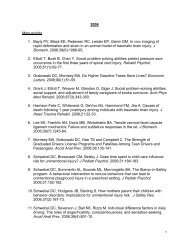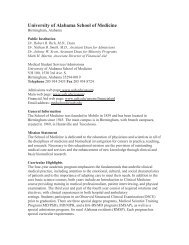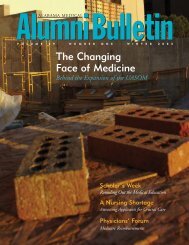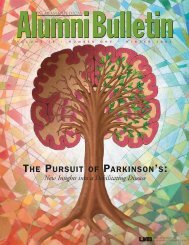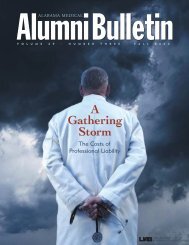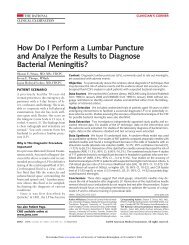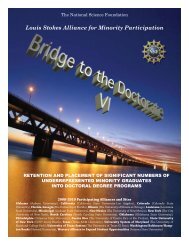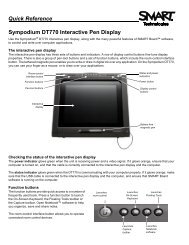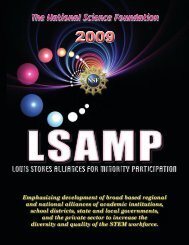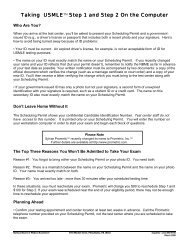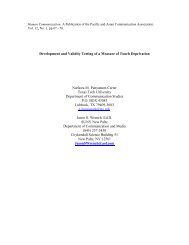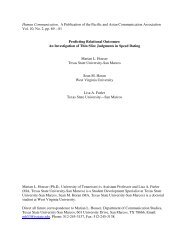In Pursuit of Precision - University of Alabama at Birmingham
In Pursuit of Precision - University of Alabama at Birmingham
In Pursuit of Precision - University of Alabama at Birmingham
Create successful ePaper yourself
Turn your PDF publications into a flip-book with our unique Google optimized e-Paper software.
Physicians’ Forum<br />
ly. These regul<strong>at</strong>ions will, for example, force<br />
everyone to use the same form<strong>at</strong> when transmitting<br />
p<strong>at</strong>ient claims inform<strong>at</strong>ion. This is a very<br />
positive step, but it will require billing <strong>of</strong>fices,<br />
vendors, and payers to change a lot <strong>of</strong> computer<br />
code. Physicians and hospitals th<strong>at</strong> are not<br />
computer savvy will be in trouble. Also, this<br />
means th<strong>at</strong> most billing codes will be standardized<br />
to a common table. <strong>In</strong> the beginning, there<br />
are likely to be many claim denials and growth<br />
in accounts receivable. All <strong>of</strong> these changes will<br />
have to be paid for by organiz<strong>at</strong>ions th<strong>at</strong> are<br />
already experiencing shrinking margins.<br />
L<strong>at</strong>er HIPAA regul<strong>at</strong>ions will focus on security<br />
and privacy. These, too, will make some significant<br />
changes in how inform<strong>at</strong>ion is shared. I<br />
am optimistic th<strong>at</strong> these changes will serve some<br />
good. After all, the electronic era we are now in<br />
makes it too easy to inadvertently cross the lines<br />
<strong>of</strong> privacy. Most <strong>of</strong> the public have no idea who<br />
can see medical inform<strong>at</strong>ion, and I think they<br />
would be shocked <strong>at</strong> wh<strong>at</strong> can be found out,<br />
retrieved, and stored forever. Some new rules<br />
and public dialogue are in order.<br />
MAB: Do you think it’s time for legisl<strong>at</strong>ion<br />
such as this to be passed, or do you see it<br />
as too much government intervention?<br />
Neilson: Global privacy control is a good<br />
issue for government to tackle. The devil, <strong>of</strong><br />
course, is in the details.<br />
MAB: Do you think the p<strong>at</strong>ient-privacy<br />
portion <strong>of</strong> HIPAA will hinder tre<strong>at</strong>ment<br />
by making it difficult for health pr<strong>of</strong>essionals<br />
to access records and to communic<strong>at</strong>e<br />
openly with colleagues?<br />
“I think the overall intentions are good, but . . . this<br />
will add more bureaucracy to an already strained<br />
health-care system and result in further intrusion into<br />
how we run our practices.”<br />
—Noble Anderson, M.D.<br />
Neilson: The rules as currently written will<br />
hamper direct communic<strong>at</strong>ion rel<strong>at</strong>ed to acute<br />
p<strong>at</strong>ient care. Either p<strong>at</strong>ients will have to sign<br />
waivers, or the rules will have to be relaxed to<br />
accomod<strong>at</strong>e certain kinds <strong>of</strong> p<strong>at</strong>ient care transactions.<br />
It won’t be too difficult for big organiz<strong>at</strong>ions<br />
to adapt once the rules are known—it<br />
is easy to code d<strong>at</strong>a for privacy if you want to—<br />
but the process will be a killer for the single or<br />
small-group practitioner.<br />
Anderson: At the present time, I do not<br />
think th<strong>at</strong> the planned regul<strong>at</strong>ions will change<br />
the way we communic<strong>at</strong>e with other physicians<br />
regarding care <strong>of</strong> the p<strong>at</strong>ient. It seems<br />
th<strong>at</strong> there have been some revisions planned<br />
th<strong>at</strong> should allow reasonable communic<strong>at</strong>ion<br />
with other physicians. Apparently, you will<br />
not be in viol<strong>at</strong>ion if you use the p<strong>at</strong>ients’<br />
inform<strong>at</strong>ion with their prior consent—a<br />
Form 506—and if it deals with payment,<br />
tre<strong>at</strong>ment, or business oper<strong>at</strong>ions <strong>of</strong> the practice.<br />
I do not think th<strong>at</strong> it will interfere with<br />
the medical care <strong>of</strong> p<strong>at</strong>ients.<br />
MAB: How will physicians be affected by<br />
the requirements th<strong>at</strong> they ensure th<strong>at</strong><br />
contractors (and their subcontractors) sign<br />
confidentiality clauses in their contracts?<br />
Anderson: Physicians will have to use additional<br />
safeguards and contracts with their business<br />
contractors to ensure their p<strong>at</strong>ients’ privacy;<br />
for example, with non-employee transcriptionists,<br />
janitorial services, etc. There are<br />
apparently some standard contracts th<strong>at</strong> we can<br />
use as guidelines for these issues.<br />
Nielson: This doesn’t bother me. I think signing<br />
confidentiality clauses is a good idea.<br />
Physicians, however, cannot ensure th<strong>at</strong> contractors<br />
abide by HIPAA—they’re not a police force.<br />
MAB: Wh<strong>at</strong> portions <strong>of</strong> HIPAA do you<br />
see as being positive? Wh<strong>at</strong>, if anything,<br />
do you think will prove problem<strong>at</strong>ic?<br />
Anderson: I see little positive in the details <strong>of</strong><br />
HIPAA. I think the overall intentions are good,<br />
but, as with many government initi<strong>at</strong>ives<br />
regarding health care, this will add more<br />
bureaucracy to an already strained health-care<br />
system and result in further intrusion into how<br />
we run our practices.<br />
“Most <strong>of</strong> the public have no idea who can see<br />
medical inform<strong>at</strong>ion, and I think they would be<br />
shocked <strong>at</strong> wh<strong>at</strong> can be found out, retrieved, and<br />
stored forever.”<br />
—Eric Nielson, M.D.<br />
Neilson: Ironically, all health-care practitioners<br />
want their own records to be very priv<strong>at</strong>e,<br />
and increased privacy is the upside <strong>of</strong> HIPAA’s<br />
regul<strong>at</strong>ions. Of course, HIPAA is a bona fide<br />
distraction from the normal work product <strong>of</strong><br />
health-care academics—th<strong>at</strong> <strong>of</strong> producing new<br />
knowledge. But by forcing us, for a time, to<br />
focus on how we will safely transmit and store<br />
this knowledge, the new regul<strong>at</strong>ions will help<br />
the medical pr<strong>of</strong>ession preserve its social contract<br />
with society. This is good.<br />
We need to guard against being too angry<br />
about this sea change. I see this already in colleagues<br />
who talk about devising systems th<strong>at</strong><br />
are so priv<strong>at</strong>e th<strong>at</strong> those who really need inform<strong>at</strong>ion<br />
will have to work too hard to get it. We<br />
have angry people talking about putting elabor<strong>at</strong>e<br />
paper shredders on garbage cans in p<strong>at</strong>ient<br />
rooms and hospital hallways, or preventing<br />
nurses and doctors from talking on phones <strong>at</strong><br />
nurses’ st<strong>at</strong>ions because a third-party health<br />
pr<strong>of</strong>essional might be within earshot.<br />
If m<strong>at</strong>urity and thoughtfulness prevail, we<br />
will be fine.<br />
15



